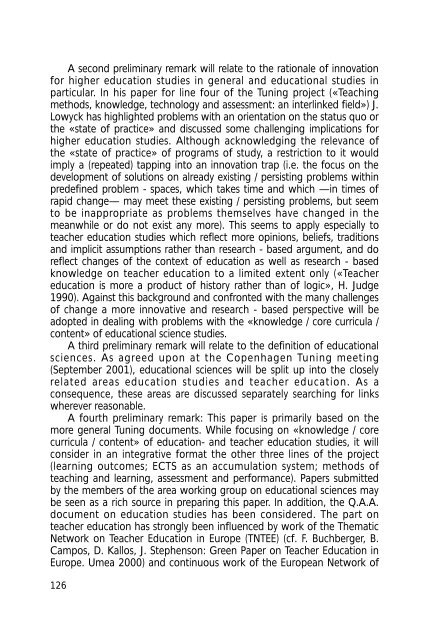Final Report Pilot Project - Relaciones Internacionales de la ...
Final Report Pilot Project - Relaciones Internacionales de la ...
Final Report Pilot Project - Relaciones Internacionales de la ...
You also want an ePaper? Increase the reach of your titles
YUMPU automatically turns print PDFs into web optimized ePapers that Google loves.
A second preliminary remark will re<strong>la</strong>te to the rationale of innovation<br />
for higher education studies in general and educational studies in<br />
particu<strong>la</strong>r. In his paper for line four of the Tuning project («Teaching<br />
methods, knowledge, technology and assessment: an interlinked field») J.<br />
Lowyck has highlighted problems with an orientation on the status quo or<br />
the «state of practice» and discussed some challenging implications for<br />
higher education studies. Although acknowledging the relevance of<br />
the «state of practice» of programs of study, a restriction to it would<br />
imply a (repeated) tapping into an innovation trap (i.e. the focus on the<br />
<strong>de</strong>velopment of solutions on already existing / persisting problems within<br />
pre<strong>de</strong>fined problem - spaces, which takes time and which —in times of<br />
rapid change— may meet these existing / persisting problems, but seem<br />
to be inappropriate as problems themselves have changed in the<br />
meanwhile or do not exist any more). This seems to apply especially to<br />
teacher education studies which reflect more opinions, beliefs, traditions<br />
and implicit assumptions rather than research - based argument, and do<br />
reflect changes of the context of education as well as research - based<br />
knowledge on teacher education to a limited extent only («Teacher<br />
education is more a product of history rather than of logic», H. Judge<br />
1990). Against this background and confronted with the many challenges<br />
of change a more innovative and research - based perspective will be<br />
adopted in <strong>de</strong>aling with problems with the «knowledge / core curricu<strong>la</strong> /<br />
content» of educational science studies.<br />
A third preliminary remark will re<strong>la</strong>te to the <strong>de</strong>finition of educational<br />
sciences. As agreed upon at the Copenhagen Tuning meeting<br />
(September 2001), educational sciences will be split up into the closely<br />
re<strong>la</strong>ted areas education studies and teacher education. As a<br />
consequence, these areas are discussed separately searching for links<br />
wherever reasonable.<br />
A fourth preliminary remark: This paper is primarily based on the<br />
more general Tuning documents. While focusing on «knowledge / core<br />
curricu<strong>la</strong> / content» of education- and teacher education studies, it will<br />
consi<strong>de</strong>r in an integrative format the other three lines of the project<br />
(learning outcomes; ECTS as an accumu<strong>la</strong>tion system; methods of<br />
teaching and learning, assessment and performance). Papers submitted<br />
by the members of the area working group on educational sciences may<br />
be seen as a rich source in preparing this paper. In addition, the Q.A.A.<br />
document on education studies has been consi<strong>de</strong>red. The part on<br />
teacher education has strongly been influenced by work of the Thematic<br />
Network on Teacher Education in Europe (TNTEE) (cf. F. Buchberger, B.<br />
Campos, D. Kallos, J. Stephenson: Green Paper on Teacher Education in<br />
Europe. Umea 2000) and continuous work of the European Network of<br />
126


